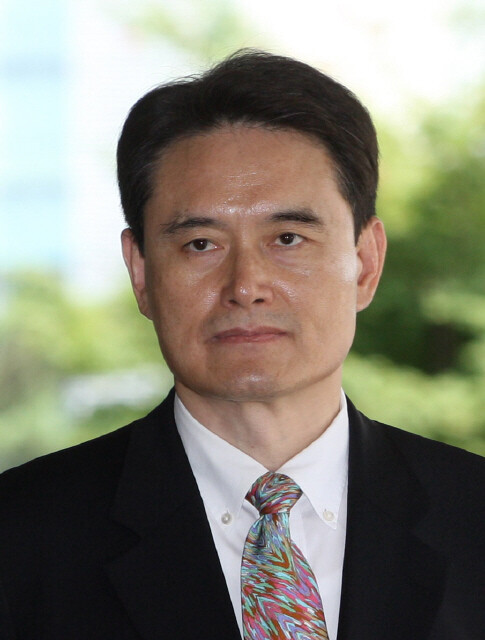hankyoreh
Links to other country sites 다른 나라 사이트 링크
Former KB Hanmaum CEO wins damages for illegal surveillance of civilians

The Supreme Court ruled on Apr. 2 to order the state and individuals involved in the illegal surveillance of former KB Hanmaum CEO Kim Jong-ik to pay him over US$400,000 in damages.
Kim, 62, was a high-profile victim of illegal surveillance of civilians by the Office of the Prime Minister (OPM) during the presidency of Lee Myung-bak (2008-13).
The court‘s second division under Justice Cho Hee-dae ruled on Apr. 4 to uphold an original court verdict partially siding with Kim and five family members in their suit claiming damages from the state and seven individuals, including former OPM public ethics support officer Lee In-kyu. In the ruling, the court ordered the defendants to pay damages of 520.92 million won (US$450,900) to Kim and his family.
“Forcing Mr. Kim to resign his post as CEO and transfer his shares to others because he had posted writings and videos on his blog maligning the President and administration policies was an illegal exercise of public authority,” the Supreme Court concluded.
“The state is liable for compensation of damages resulting from the illegal performance of duties by affiliated government employees,” it ruled.
Kim was one of the most prominent victims of illegal surveillance by the office of the OPM’s public ethics support officer during the Lee administration in 2008. Kim was targeted for having posted a video caricaturing Lee on his blog. The public ethics support officer’s office conducted an internal probe into the circumstances behind Kim’s posting of the video and the possibility of his having embezzled company funds.
In the process, former office secretary Won Chung-yeon also visited the KB labor team leader and threatened that the bank‘s CEO would “not be free” if Kim were left in place. Kim subsequently shut down his blog, but the OPM continued making threats until he finally resigned as CEO and forfeited his company shares. Kim ended up selling 75% of his stake in KB Hanmaum at a heavy discount.
In response to the actions, Kim filed suit against the state claiming 1.285 billion won (US$1.1 million) in damages for being “forced to resign as CEO and sell shares to others at a discount due to illegal monitoring” and for “concealment of documents and damaging of hard disks in relation to [the surveillance] that hindered the investigation and made it impossible to bring certain facts to light.”
In the first trial, the court recognized liability for 385.92 million won (US$334,000) in back pay and 40 million won (US$34,600) in “consolation money,” noting that Kim had been allowed to work for three years longer than the typical term for a CEO. In the second trial, the court set the consolation money at 100 million won (US$86,600) - 60 million won higher than first court. Explaining its decision, it cited the “need to deter and prevent similar instance of these illegal actions, which were a grievous violation that threatens to damage a cornerstone of democracy.” The court also recognized damages of 35 million won (US$30,300) to Kim’s family members.
But the earlier courts also said they could not recognize Kim as having suffered a loss from his KB Hanmaum stock sales because he could not be viewed as the company’s actual owner.
“The civil courts did not recognize Mr. Kim’s status as majority shareholder and CEO as the criminal courts did. That part is incomprehensible,” said attorney Choi Gang-uk, who represented Kim.
Lee In-kyu was previously sentenced to ten months in prison in 2013 on charges of abuse of authority and coercion for conducting illegal surveillance on Kim and forcing him to give up his KB Hanmaum shares.
By Seo Young-ji, staff reporter
Please direct questions or comments to [english@hani.co.kr]

Editorial・opinion
![[Column] Season 2 of special prosecutor probe may be coming to Korea soon [Column] Season 2 of special prosecutor probe may be coming to Korea soon](https://flexible.img.hani.co.kr/flexible/normal/500/300/imgdb/original/2024/0426/3317141030699447.jpg) [Column] Season 2 of special prosecutor probe may be coming to Korea soon
[Column] Season 2 of special prosecutor probe may be coming to Korea soon![[Column] Park Geun-hye déjà vu in Yoon Suk-yeol [Column] Park Geun-hye déjà vu in Yoon Suk-yeol](https://flexible.img.hani.co.kr/flexible/normal/500/300/imgdb/original/2024/0424/651713945113788.jpg) [Column] Park Geun-hye déjà vu in Yoon Suk-yeol
[Column] Park Geun-hye déjà vu in Yoon Suk-yeol- [Editorial] New weight of N. Korea’s nuclear threats makes dialogue all the more urgent
- [Guest essay] The real reason Korea’s new right wants to dub Rhee a founding father
- [Column] ‘Choson’: Is it time we start referring to N. Korea in its own terms?
- [Editorial] Japan’s rewriting of history with Korea has gone too far
- [Column] The president’s questionable capacity for dialogue
- [Column] Are chaebol firms just pizza pies for families to divvy up as they please?
- [Column] Has Korea, too, crossed the Rubicon on China?
- [Correspondent’s column] In Japan’s alliance with US, echoes of its past alliances with UK
Most viewed articles
- 1[Column] Season 2 of special prosecutor probe may be coming to Korea soon
- 2‘We must say no’: Seoul defense chief on Korean, USFK involvement in hypothetical Taiwan crisis
- 3Division commander ordered troops to enter raging flood waters before Marine died, survivor says
- 4Is N. Korea threatening to test nukes in response to possible new US-led sanctions body?
- 5Is Japan about to snatch control of Line messenger from Korea’s Naver?
- 6No good, very bad game for Korea puts it out of Olympics for first time since 1988
- 7[Editorial] Korea’s surprise Q1 growth requires objective assessment, not blind fanfare
- 8Korea’s 1.3% growth in Q1 signals ‘textbook’ return to growth, says government
- 9N. Korean delegation’s trip to Iran shows how Pyongyang is leveraging ties with Moscow
- 10Amnesty notes ‘erosion’ of freedom of expression in Korea in annual human rights report